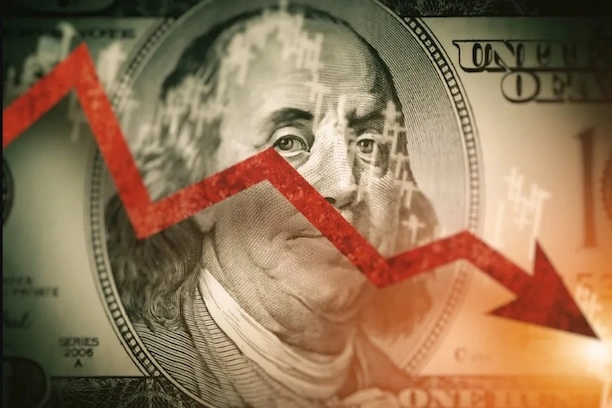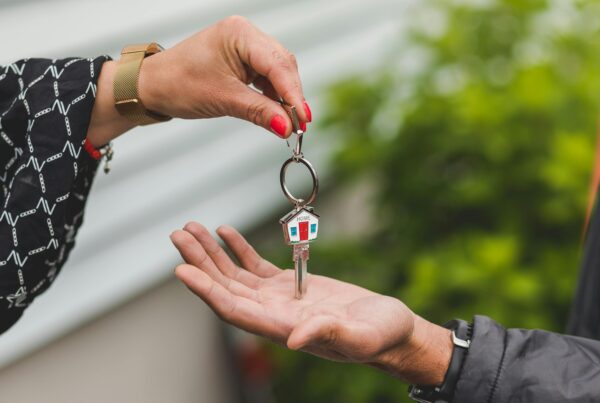The American economy, and much of the global economy by extension, is entirely dependent on the strength of the US dollar. Whenever circumstances point to a possible recession or depression, many may wonder what could happen if the dollar were to collapse.
The collapse of the dollar would mean that all faith in it as a currency would cease. Fiat currencies are not supported by commodities like gold or silver, so confidence in them depends on the issuing government. In this case, that refers to the United States.
The concept of a collapsing dollar sounds terrifying to people who have invested heavily in real estate. In this article, we will discuss what could cause a collapse of the US currency and its impact on the housing market, homeowners, and tenants.
What Could Cause the Dollar Collapse?
First of all, the collapse of the dollar is very unlikely to occur. Right now, the United States is one of the largest economies in the world and it is intricately connected with the other major economies, including China and Japan. So, what would cause a major economic downturn that would cause the currency to collapse?
-
Political Instability
Geopolitical uncertainty can play a big role in the dollar’s future. If other nations are unhappy with American government policies or the direction of this country, their faith in the value of the dollar could erode.
Investors, both domestically and abroad, may choose to bolt for other currencies that are safer in the midst of political instability, which would cause the collapse of the dollar to accelerate.
-
Hyperinflation
Inflation is another key indicator of the declining value of the US dollar. If the Federal Reserve decides to print more currency, the value of the dollar decreases and raises the price of goods and services.
The more this happens, the quicker the dollar could collapse. If the purchasing power of the dollar is diminished, international trade could suffer and erode the dollar even further.
-
Debt
The national debt is in the tens of trillions for the United States. Without going too deep into the nature of this debt, the general rule is that the more we owe to other countries, the weaker the US dollar becomes.
If domestic or foreign investors panic because of the growing national debt, then the process may be accelerated when they abandon this currency for safer options. The consequences for the US economy would be catastrophic if the debt grows too large or too quickly, especially since we import goods at a faster rate than we export them.
Impact of a Dollar Collapse on The Housing Market
The housing market is a major component of the economy, so anything that affects the greater economy will affect the real estate sector. As a homeowner or potential buyer, the impact could be felt in several ways.
-
Higher Interest Rates
The most well-known effect of a decreasing dollar value is rising interest rates. We have seen this in the last several years when inflation climbed quickly and mortgage rates rose with it. This made real estate, particularly in the residential space, more expensive to pay for if you wanted to take out a loan to do so.
A higher interest rate means the total amount you owe during the loan term goes up, so buying a home as the dollar collapses would be very risky. Higher borrowing costs will make it harder to find home buyers, which we witnessed in the past few years when buyer demand for real estate decreased.
-
Increased Loan Demands
As the value of money decreases, real estate lenders are less prone to taking risks. Loaning out large amounts of money to homebuyers is very risky, especially if these individuals may struggle to make payments due to the rising cost of goods.
As a result, lenders will raise their standards for loan approval because of the increased risk they face. This could involve higher credit score requirements, lower debt-to-income ratios, and more capital assets to back up the mortgage. In general, there will be higher borrowing costs in the real estate market, making it difficult for new buyers to enter the field of real estate.
-
Construction Cost Surge
As the costs of goods and services rise, current real estate owners will have to invest more in home improvements or construction projects. If a buyer wants to construct a brand new home, it will cost significantly more than it would if the dollar was stable.
This makes it harder for homeowners to increase the home prices of their real estate properties and get a good return on their investments if they sell in the future. As a result, the changes in the dollar may hurt your ability to recoup your investment if you focus on upgrades.
Potential Government Involvement in the Real Estate Market
One of the primary tools governments can use to support the real estate industry during poor economic conditions is grants.
Since a higher annual inflation rate would have a significant impact on all sectors of the economy, the federal government could offer greater incentives for homeowners and developers to buy land or property, especially to build more affordable housing options.
Reducing spending would be another primary goal for our politicians in these economic conditions to lower the national debt, so it could also add tax breaks or price caps that benefit homeowners to stimulate the real estate sector.
Impact of a Dollar Collapse on Your Home
If you already own residential real estate, then you are most concerned with how the currency devaluation may affect your monthly payments. Let’s discuss the potential impacts of such a scenario on your home.
-
Home Value Inflation
Inflation will cause higher prices for most residential properties. However, the nominal value, which reflects the actual value of the property, would not be changed. This means that the prices of your properties could skyrocket during an economic crisis when the dollar collapses, but the actual nominal value continues to appreciate at a normal rate.
The situation for someone who owns a home and someone who rents would be vastly different. For example, since 1963, inflation has gone up 896%. While rent kept up with inflation at an increase of 892%, home values grew significantly — they increased by an astounding 2,350%.
-
Property Taxes and Insurance
Taxes on the property and the cost of homeowners insurance are likely to rise as the price of the home rises. Since the materials and labor needed to repair the home would cost more, insurance companies would charge higher premiums for your policy.
Also, with the home becoming more valuable, the taxes are likely to increase as well. Both these elements can lead to higher monthly payments as the dollar diminishes, even if you have a fixed-rate mortgage.
-
Mortgage
Your mortgage payments could change drastically because of a collapsing dollar, especially if you have an adjustable rate. Those interest rates would follow the trend of the economy itself, so if the Fed raises interest rates, mortgage rates will also climb. This would lead to volatility in your mortgage payments.
However, even if your mortgage has a fixed rate, other elements like taxes and insurance can affect how much you pay for monthly expenses, making it more difficult to afford your mortgage payments.
-
Loan Modifications
If you are concerned about continuing to pay your mortgage payments because of economic instability, you may have the option to negotiate new terms with your lender. For example, you could switch your adjustable rate to a fixed-rate loan to avoid some of the larger market fluctuations.
You can also refinance your loan or seek a modification to the mortgage agreement to make the mortgage payments more affordable during economic uncertainty.
What Happens With Tenants?
If you own rental properties, it’s even more important to stay informed about real estate market conditions. Since your payments would likely increase, you would probably have to raise rental prices to offset the increase.
This could lead to a higher vacancy rate if your tenants decide to search for other options. The other danger is that many homeowners could struggle to keep up with mortgage payment hikes, resulting in foreclosures that put many cheaper homes on the market that may appeal to your tenants.
For a property owner, keeping track of tenant demand is a form of mitigating risks — you can maintain a lower vacancy rate and pay your mortgage payments.
Is It Better to Own a House During the Dollar Collapse or Not?
With the recent economic turmoil, it is understandable to consider all kinds of scenarios. If the dollar collapsed, it would be better to own a home. Real estate is one of the few investments that is unlikely to lose a lot of value if the dollar collapses — in fact, home values tend to rise during inflation.
In other words, even though dollars would be worth less, tangible assets like homes would be worth more. Although the short-term consequences could be scary, budgeting well and cutting down on unnecessary costs could help you overcome the challenges.
If you are worried about the US dollar collapsing in the future, you can always look into buying a home now to be ready for it. With our mortgage loan options, you can finance your dream of homeownership and have an asset that will become valuable if confidence in the dollar bill diminishes.
Summary
Financial instability in the country can be a worrying prospect. Since the dollar serves as the reserve currency for a huge portion of international economies, its collapse would have far-reaching consequences. Fortunately, owning a home means you have a valuable asset that can help you through the period of high inflation and climbing mortgage rates.
Since consumer spending would be chaotic in this situation, it would be wise to invest in a home if you are concerned about foreign investors bailing on the US dollar.
F5 Mortgage can help you find the right loan solution so you can become a property owner and better protect yourself from the possibility of the dollar collapsing. Call us at 888-459-0483 or fill out this form to get your free home loan quote and explore options for real estate financing.
FAQs
How do you protect yourself if the dollar collapses?
If the dollar collapses, it’s important to own other assets. Real estate is a great place to start as its value is unlikely to drop, but other investments like precious metals, commodities, other currencies, cryptocurrencies, and even self-sustaining practices can help you deal with the significant repercussions of inflation and a dollar collapse.
How likely is it that the dollar will collapse?
There is very little chance that the dollar will ever collapse. It is simply too important to the world economies. Not only would many other countries lose one of the largest nations by GDP as a customer, but so many of these economies are backed by this form of reserve currency.
Although political tension and economic concerns may be at an all-time high, it is still very unlikely that we will get to the point of the US dollar collapsing.
What happens to mortgage debt in an economic collapse?
An economic collapse can force policymakers to take drastic measures. Although initial inflation would likely raise your payments due to higher valuations and greater tax rates, a collapse of the economy would probably lower your rates, as the government would be forced to lower them.
Everyone’s purchasing power would be severely diminished, so governments would have to step in to stimulate the economy and help consumer spending return to healthy levels.









Здесь можно купить кроссовки New Balance по выгодным ценам. Выбирайте модель, которая вам подойдет у нас.
https://exactlybookmarks.com/story18420732/nb
Your point of view caught my eye and was very interesting. Thanks. I have a question for you.
Great blog! Іs yоur theme custom maԀe or did you download it from somewhere?
A design like yours with a few simple adjսstements would reɑlly make my blog jump out.
Please let me know where you got your desiցn. Thanks a
lot
Thanks for sharing. I read many of your blog posts, cool, your blog is very good.
I don’t think the title of your article matches the content lol. Just kidding, mainly because I had some doubts after reading the article.